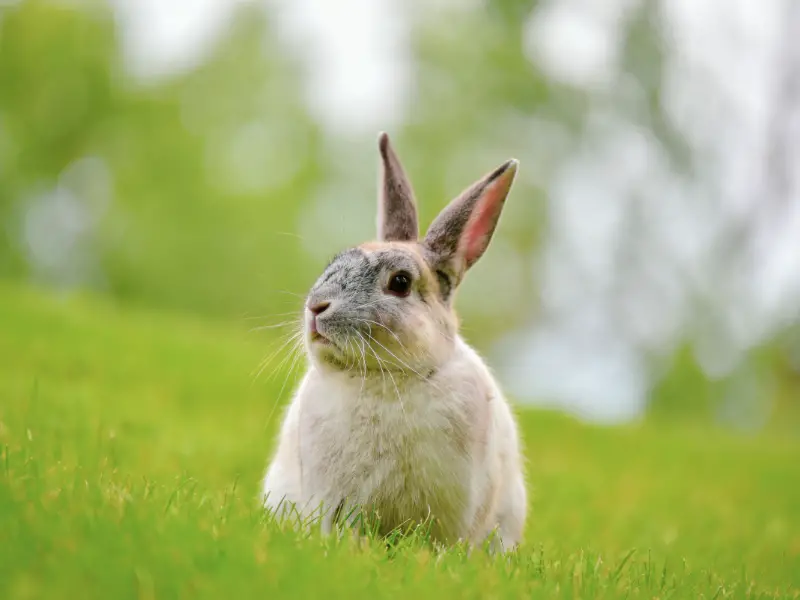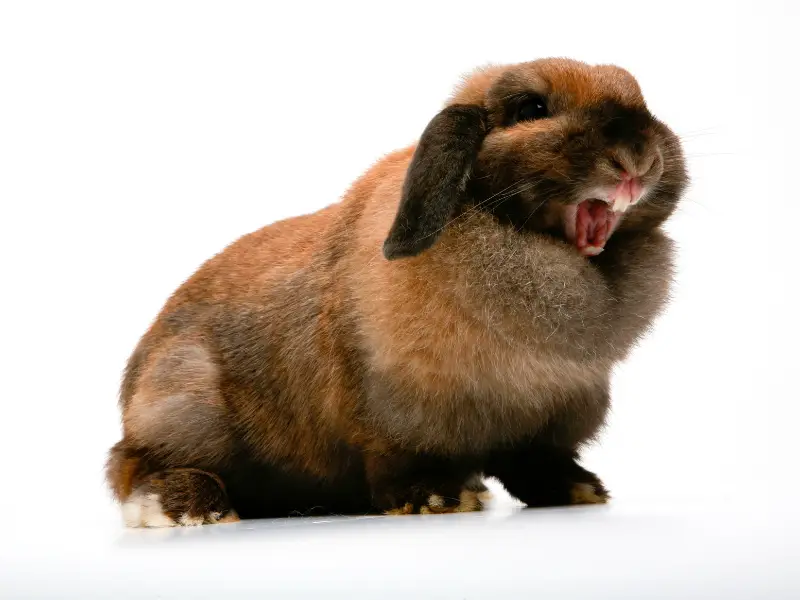Discovering that your sweet bunny has a voice (and sometimes an angry voice) can be pretty unsettling, especially when they’re upset about something you may have done. You can’t be sure, but you could have sworn your bun growled at you.
But do rabbits growl?
Rabbits do growl, especially when they’re angry. They also growl when they feel threatened or territorial. Hissing, lunging, and a snorting sound can also accompany the growling. Rabbits will also growl when they’re afraid.
Has your rabbit started growling at you, and you don’t understand why? This guide will provide you with all the information you need.
What Does It Sound Like When a Bunny Growls?
Rabbits are quiet animals, and they communicate primarily through the use of body language. If you have annoyed your bun somehow, you may notice them crouch down and make a soft “huff” sound that vibrates.
Sometimes a rabbit’s growl can come out as a sudden squeaky noise. The sound is nowhere near the sound of a growling dog. The growl can go on for a few seconds, sometimes ending with a soft snort.
A rabbit growl is very different from the sneezes and tooth-clicking noises you may have heard before. Usually, when a rabbit growls, it’s followed by a hissing noise or a lunge.
Did you know? Rabbits are known to throw temper tantrums when things don’t go their way. For example, if you put your bun in their cage before they are ready, they will thump their hind legs and turn their back on you.
What Does It Mean When Rabbits Growl?
If your rabbit is growling at you, they are either angry, feeling threatened and territorial, or wants you to leave them alone.
Consider a growl a warning. Your bun is trying to tell you that they’re upset.
Continuing to approach your bun while they’re growling might force your rabbit to lunge at or nip you. If your bun pulls its ears back at a 45° angle and its fluffy tail is erect, this shows they’re about to bite you.
You should consider getting out of your floppy-eared friend’s way and giving them space to calm down. Continuing to approach your rabbit will make them more anxious and aggressive.
Good to know: Rabbits suffer from gas buildup, and it’s easy to mistake their stomach growling for a warning growl. If you’re concerned, you must take them to the vet urgently, as trapped gas can be fatal for rabbits if ignored.
Reasons Why Your Rabbit Growls

Just like other animals, rabbits growl to show their unhappiness with a situation. Let’s take a closer look at some of the reasons why rabbits growl:
Sudden Movements
Rabbits are very skittish animals and don’t like sudden movements or loud noises. Barging into a room or catching your bun unawares can cause them to growl at you out of fear. Waving your hands in the air can also frighten them.
Holding Them
In general, rabbits don’t like to be picked up. By holding them and carrying them around, you make them feel vulnerable. Rabbits are prey animals and don’t like to feel restricted. Your bun will try to break out of your hold by wriggling around and scratching you with its nails.
If this is unsuccessful, they will growl at you and possibly throw in a snort or two to get the message across.
Feeling Territorial
Rabbits can become very territorial over things they claim as their own. This can be a food bowl, toys, litterbox, their owner, or another rabbit. If you attempt to get into their space and aren’t welcome, your rabbit will growl at you (or another rabbit).
This is often followed by a swatting movement to try and get you to back off. They’ll hiss and lunge at you if you continue to approach them.
Feeling Protective
If you have a doe (female rabbit) that has recently kindled (birthed) a litter, you may find that she doesn’t want you near the kits (babies). The mother instinct has kicked in, and she wants to protect her kits.
When you try to reach into the nest, the doe will growl at you to show that she’s not happy with the situation.
Be careful if she starts lunging as she will attempt to bite you. You should respect your rabbit and back off before you further upset her.
Having a Bad Day
Sometimes your bun may growl at you simply because they’re having a bad day.
Rabbits have feelings too. Some days, they just aren’t in the mood for interactions or noise. If your bun is grumpy, they’ll ignore you when you talk to them.
If you continue approaching them, they’ll growl at you to show disapproval. Again, you must respect your bun’s feelings and try again later.
How to Stop Your Rabbit From Growling
Unfortunately, growling can develop into a bad habit, which will affect your relationship with your bun. You must handle the situation correctly.
Here are some helpful tips on how to stop your bunny from growling:
1. Make yourself appear smaller. Get lower so you’re more on their level when approaching them. This makes you less intimidating.
2. Speak in a calm and reassuring voice. Avoid getting angry as this will stress your rabbit out more.
3. Don’t try to pet your rabbit while they’re growling. Remember, they’re feeling threatened and will try to bite you.
4. If they feel territorial over a particular object or area, move away (or put the object down) until they stop growling.
5. Back out of their living area and leave the door to the hutch open so they can come out when they feel more relaxed.
6. Once your bun approaches you, attempt to stroke them from above (just in case they try to nip you). Talk in a soothing voice and keep your movements small and slow.
7. Your bun should calm down, and you’ll notice the tension in your body fades away.
If your bun continues to growl and remains tense, you should give them more time to calm down and try to approach them again later.
My Last Bunny Thoughts
If you take the time to sit with your bunnies and watch them interact with one another (and you), you’ll quickly pick up on how unique their quiet language is.
Rabbits don’t need to bark to convey a message to their owners or their mates.
Instead, they use very subtle body language accompanied by unhappy growls to show when they’re upset. The main thing is to respect your floppy-eared friends’ boundaries when they growl and give them time to cool off.
Understanding your rabbit’s cues will help you care for your rabbit better.
Related Articles:

